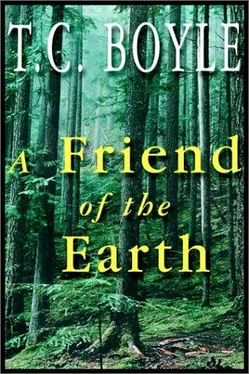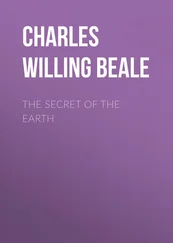Then, one day, a postcard slipped out of the pile of bills, letters, invitations, solicitations, violations, entreaties and threats his secretary mounded on his desk each morning. It featured a logo he'd never seen before — a crimson circle with a raised fist in the center of it (his first thought was the Black Panthers — but weren't they all dead, in jail or running Nike outlets?). It wasn't the Black Panthers. It was E. F.I- Earth Forever! — Inviting him to attend a powwow/chili cookoff/apocalyptic lecture/slide show at the home of Linda D 'Piqua-Hoover in Croton. He turned the postcard over in his hand. Dear Mr. Or Ms. Tienvater, it read, Are you concerned about the environment? Do you care about the rape of our forests, the pollution of our streams and rivers, the acid rain killing off the pristine lakes of the Adirondacks? Are you tired of promises? Fed up? Ready for Direct Action? Then come to ow; etc.
He went. Why? Boredom, curiosity, the desire to duck the Sherrys of the world and meet some environmentally minded women who might just want to share a freeze-dried entree and a sleeping bag on the shore of an acidic lake somewhere. And more — and he wouldn't want to make light of this-because he believed. He did. He genuinely did. He needed an awakening, a cause, a call to arms — and here it was.
It was raining the night of the powwow, a cold soulless wintry rain that wrung out the sky like an old cloth and found its way into the seams of his boots and down the collar of his jacket. He stepped out of the office and into a world from which every trace of light had been relentlessly squeezed. The moon imploded, the stars erased — there was no illumination without electricity, and electricity lit his path from the office to the car. The car itself was another kind of environment, a sort of rolling sarcophagus. It spat its fumes into the air, coughed and shook, gave off its stink of incinerated metal. Beyond the rain-scrawled windows lay the shopping center — the Copper Beech Shopping Center-curled into the killing night like the architecture of his nightmares. He sat there breathing the carbon monoxide coming through the floorboards till his classic 1966 Mustang could be coaxed into moving without stalling, and then he was off, rocketing over the potholes like a master of nature and machine alike.
He made an uncanny series of wrong turns, U-turns and gravel-churning retreats, all the while consulting the map reproduced on the back of the card, until finally the D 'PiquaFloover house loomed up out of a dark lane, lit like a supernova. Import cars clustered around it, sleek and menacing in their steel skins. The black lawn glittered in the light of a hundred windows. His feet found the flagstone path, and then a tall woman in post-hippie Birkenstocks was greeting him at the door, so good of him to come and did he know Mrs. Somebody, chair of the Something Committee? He took Mrs. Somebody's limp hand in his own-she must have been seventy — and then made his way toward the bar, the scents of woodsmoke, body heat, perfume and warring chilies rising up to envelop him as he inserted himself into the crowd. A man in cummerbund and bow tie handed him a glass of wine. He wanted scotch. But he accepted the wine, sipped it and took a moment to get his bearings.
That was when he first noticed Andrea. She was in the corner, hunkered over a bowl of yogurt dip with a handful of carrot sticks and broccoli florets, gathering faces round her like a puppet master. Her free hand (ringless, chapped, the nails bitten down to translucent slivers) was in constant motion, underscoring each point she made, and she made a lot of them. She was talking with animation and confidence, lecturing, though he couldn't hear what she was saying from where he stood with his nose in a long-stemmed glass. He must have watched her for a full five minutes, picture only, the sound muted, before he found himself moving toward her — and he wasn't moving consciously, not at all; it was more in the way of a moth following a pheromone trail. He fluttered his wings and sailed across the room.
(I need to describe her as she was then — and none of this black hair dye and she looks pretty good for a sixty-sevenyear-old and all the rest of an old man's twice-burned revisionism-because you have to experience this for yourself Be there. Step into the room, feel the heat of the big hardwood fire carbonizing the air, smell the simmering pots of chili and the burned-dust odor of the slide projector, inhale the aroma ofcoffee-decafand espresso — and the perfume of forty women who want to give the impression that they're wearing nothing at all but the scent they were born with. "Natural" is the word here. Earnest. Committed. And quick now, what's an environmentalist? Somebody who already has their mountain cabin.) She gave him a look — the quickest snatch of her eyes — and admitted him to her circle. She was talking about logging in the West, some forest in Oregon he'd never heard of, old growth going down, weep for the animals, weep for the earth. He wasn't listening. Or not particularly. He was too busy studying her, enjoying her lips and the intensity of her eyes, trying to break her code and assimilate it. She might have been a steelworker or glass blower, her face shining with a light that seemed to radiate from a place just under her chin, the light of hammered ingots, molten silica, fire, and her hands were big and mannish, hands that had done things, accomplished things-An activist's hands, he told himself, as he clutched the glass of wine and moved in still closer, already sick with the romance of it-Save the world, sure, and get laid too.
Her hair was blond in those days — then, and for all the time he knew her, but for those special occasions when they went out in the night to strike back at the machine and she dyed it dirt brown or fish-belly gray — and it was cut and parted in a way that allowed it to fall across her face whenever she tilted her head. The hair would fall-good hair, healthy hair, California hair — and then she would push it back, and you saw her hands, or she'd give her chin a flick so that her hair would grab the light and drop unerringly into place, and you saw her eyes. Tierwater saw them. He saw her. And even before he understood she was the main attraction of the evening-along with Teo, that is-he pushed his way through the scrim of faces hanging at her shoulder and introduced himself. "Hi," he said, showing his teeth in his best imitation of a grin, "I'm Ty Tierwater, and you're-"
What was he wearing? He wouldn't remember. Certainly nothing that could be described as environmentally chic-no Gore-Tex or Bion II or anything like that. He looked like a bum, most likely. And why not? He wasn't going anywhere, Give him a three-day growth of prematurely graying beard (graying to the chin only, and no higher), blue jeans spattered with paint and spackle and other accoutrements of the building-management trade, a bomber jacket so crosshatched with age it looked as if it had been varnished over by one of the Italian masters. Style he didn't have. He would have been the first to admit it. But he wasn't bad-looking, depending on your taste. Thin. Skinny, actually — but at least he hadn't gone to fat like every other thirty-nine-year-old in America. He had most of his hair and a good proportion of his teeth and he could lift anything, throw it over his shoulder and walk to hell and back with it if the right woman were to ask him. And he was a patient, tireless and tender lover, a combination of adjectives and a resonant noun he should have had printed up on a T-shirt. It couldn't have hurt his chances.
Her hand was in his. He felt a roughness there, callus, the horn of work and worry, but a frankness too-no bullshit here, her handshake said. Her lips were moving too. "Andrea? 'She said, in answer to his question, and her voice surprised him, so high and piping, so pure, when he'd expected a rasp, a growl deep in the throat-Let's get down on all fours and fight over the meat-" Andrea Cotton."
Читать дальше












